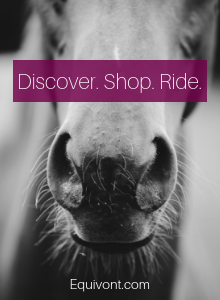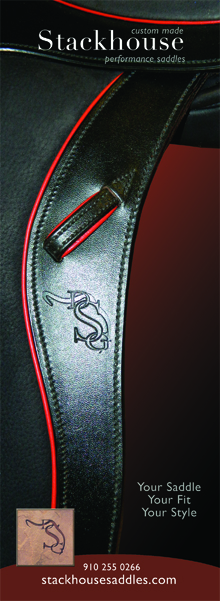Search the Site
Guest Blog post # 30: "Pro and Con Tact" from the great Bill Woods!
Pro and Con Tact
Picture the friendly cop on the beat strolling along the sidewalk, nodding to shopkeepers, and twirling his night stick as he oversees his neighborhood.
Alternatively, imagine a not so friendly policeman slapping his nightstick into the palm of his hand and rousting out vagrants loitering in doorways or trying to catch a nap on a park bench. Two very different relationships—each representing the way your horse can interpret the concept of contact.
The most rudimentary state of the contact relationship is one where there is literally no relationship at all. First impressions being what they are, this is where introducing the idea to your green horse gradually and with maximum tact and kindness will pay off down the road. The weight in the reins can be quite light, the relationship a passive one where the horse simply accepts the presence of your hand touching his mouth. Your elastic elbows promise a hand which follows the motion of his head and neck completely without interference.
Bear in mind that it is not correct to ride on slack reins and drive the horse forward until he comes to the contact. Sometimes you can drive forever before that happens. Rather, you must meet the horse with your hand to provide him a destination into which to deliver his energy and trust.
Otherwise it would be like turning on your faucet without putting an empty glass underneath it!
Getting back to our policeman analogy, you will encounter many horses who have a preconceived negative notion of what contact entails. They may be intimidated by it and want to curl and retreat from the bit. They may want to hollow their backs, raise their heads, and brace with an inverted neck. Or they may want to assertively lean against the hand and make the rider hold the horse's front end up or restrain his forward movement. One new student advised me that a former instructor told her to keep ten pounds of weight in each rein. Is it any wonder that her horse might have developed some resistance to the notion of contact?
There will be specific instances where for a finite period of time an increased pressure in the horse's mouth is necessary. These are exceptions, not the norm. In the best world there will be a positive but mild tension on the reins. Go back to the analogy in my book of the string held in your hand and tied to a small block of wood which is being drawn downstream by a gently flowing current. The baseline weight in your hand should be measurable in ounces, not in pounds. If a close up examination of the rein reveals a constant stress of the leather fibers, one or another of you is pulling! That is not what we mean by a desirable contact.
The reins are not meant to be a physical restraint. It's not like chaining some madly slavering dog to a stake. All your aids—the reins included—are meant to provide boundaries within which the horse is permitted to work. A horse on contact is more like a dog walking obediently at heel. There is a mutual presence and an interactivity but it must be agreeable and not coercive.
This is not to say that the reins are always totally passive—not by any means. But contact self is not a message. It is simply the medium through which you transmit a message. The message itself is the momentary interruption of a soft, following hand. Of course, I am speaking of half halts which are not simply a rein effect but a coordination of all the aids to reshape or rebalance your horse. The kinds of messages they transmit can be multifaceted and nuanced. And sometimes the message must just plain be strong. But it at no time can it be so harsh as to cause the horse to lose faith in that policeman. That's where the measured, tactful modification of behavior comes in.
Blog by Bill Woods @ http://www.woodsdressage.com/blaggo_UR8C.html
Picture the friendly cop on the beat strolling along the sidewalk, nodding to shopkeepers, and twirling his night stick as he oversees his neighborhood.
Alternatively, imagine a not so friendly policeman slapping his nightstick into the palm of his hand and rousting out vagrants loitering in doorways or trying to catch a nap on a park bench. Two very different relationships—each representing the way your horse can interpret the concept of contact.
The most rudimentary state of the contact relationship is one where there is literally no relationship at all. First impressions being what they are, this is where introducing the idea to your green horse gradually and with maximum tact and kindness will pay off down the road. The weight in the reins can be quite light, the relationship a passive one where the horse simply accepts the presence of your hand touching his mouth. Your elastic elbows promise a hand which follows the motion of his head and neck completely without interference.
Bear in mind that it is not correct to ride on slack reins and drive the horse forward until he comes to the contact. Sometimes you can drive forever before that happens. Rather, you must meet the horse with your hand to provide him a destination into which to deliver his energy and trust.
Otherwise it would be like turning on your faucet without putting an empty glass underneath it!
Getting back to our policeman analogy, you will encounter many horses who have a preconceived negative notion of what contact entails. They may be intimidated by it and want to curl and retreat from the bit. They may want to hollow their backs, raise their heads, and brace with an inverted neck. Or they may want to assertively lean against the hand and make the rider hold the horse's front end up or restrain his forward movement. One new student advised me that a former instructor told her to keep ten pounds of weight in each rein. Is it any wonder that her horse might have developed some resistance to the notion of contact?
There will be specific instances where for a finite period of time an increased pressure in the horse's mouth is necessary. These are exceptions, not the norm. In the best world there will be a positive but mild tension on the reins. Go back to the analogy in my book of the string held in your hand and tied to a small block of wood which is being drawn downstream by a gently flowing current. The baseline weight in your hand should be measurable in ounces, not in pounds. If a close up examination of the rein reveals a constant stress of the leather fibers, one or another of you is pulling! That is not what we mean by a desirable contact.
The reins are not meant to be a physical restraint. It's not like chaining some madly slavering dog to a stake. All your aids—the reins included—are meant to provide boundaries within which the horse is permitted to work. A horse on contact is more like a dog walking obediently at heel. There is a mutual presence and an interactivity but it must be agreeable and not coercive.
This is not to say that the reins are always totally passive—not by any means. But contact self is not a message. It is simply the medium through which you transmit a message. The message itself is the momentary interruption of a soft, following hand. Of course, I am speaking of half halts which are not simply a rein effect but a coordination of all the aids to reshape or rebalance your horse. The kinds of messages they transmit can be multifaceted and nuanced. And sometimes the message must just plain be strong. But it at no time can it be so harsh as to cause the horse to lose faith in that policeman. That's where the measured, tactful modification of behavior comes in.
Blog by Bill Woods @ http://www.woodsdressage.com/blaggo_UR8C.html







0 Comments Posted Leave a comment